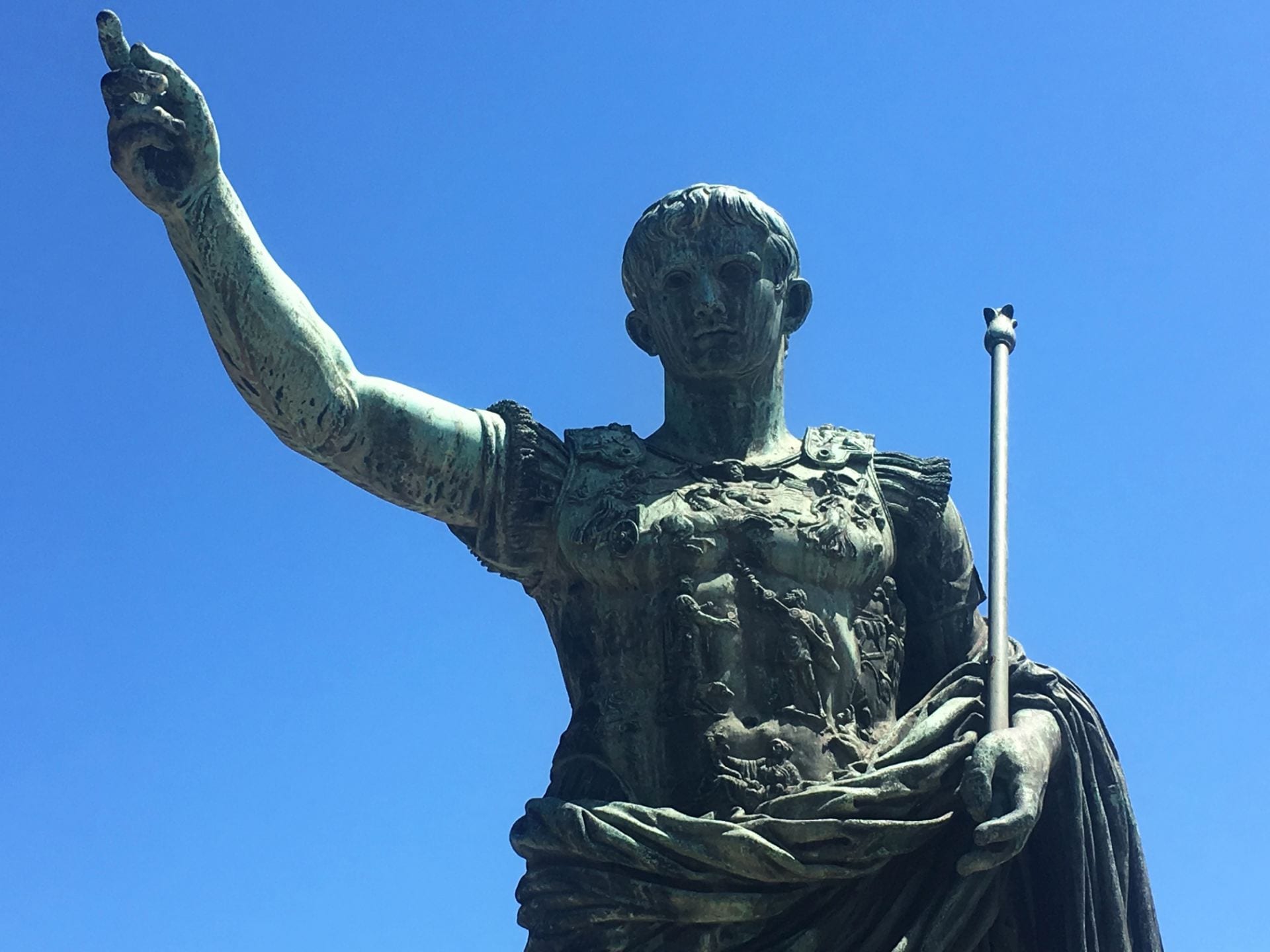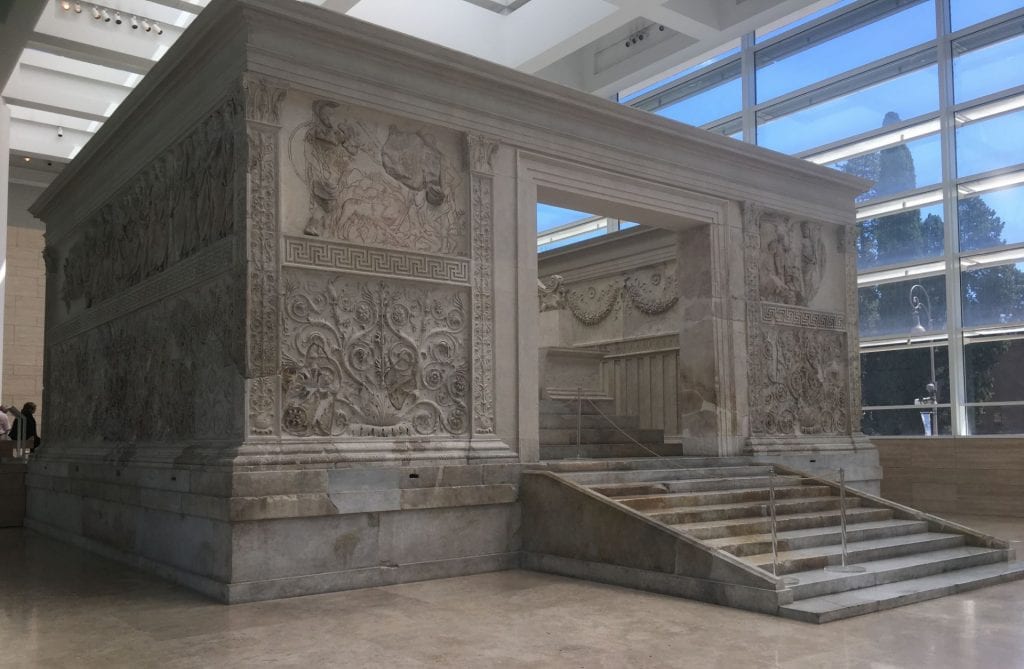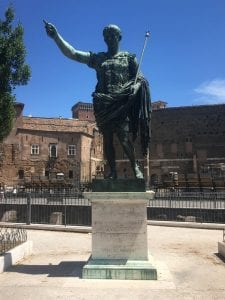
Revisiting Augustus’s Alternative Truth
In October 2018 the inimitable Associate Professor Frederik Vervaet presented a riveting public lecture entitled “‘Monarch by Universal Consent’: Revisiting Augustus’ Alternative Truth”, as part of the 2018 Truth SHAPS Public Lecture series. The lecture presented a discussion of the ancient Roman emperor Augustus and the “fake news” in his propaganda. Here, Donna Storey presents a summary of that lecture.
Associate Professor Vervaet took the attentive, standing room only, audience through a retrospective of Augustus’ Res Gestae, the official record of achievements of the former Roman Emperor written in 13 CE, one year before his death. An original version of the Res Gestae was discovered on the wall of the Temple of Ancyra (Ankara) in Turkey. The text is also inscribed in full (on the orders of Mussolini) on the side of the podium that hosts Augustus’s monument, the Ara Pacis Augustae in Rome. The Augustan Altar of Peace, dedicated to the Roman goddess of Peace, Pax, was commissioned by the Roman Senate to honour Augustus’ return after a three-year absence. The altar depicts the Augustan vision of Roman civil religion and served as propaganda. Rather than laud the list of achievements, Associate Professor Vervaet confronted the so-called truths of the Res Gestae and revealed the depths of what could be better described in modern parlance as “alternative facts”.

Born in 63 BCE, Augustus claimed his political inheritance as the adopted son (technically nephew) of Julius Caesar in 44 BCE, barely two months after Caesar’s assassination on the Ides of March. Fourteen years later in 31 BCE, he defeated Marc Antony and Cleopatra in the Battle of Actium, paving the way for close to 45 years of rule as Emperor across the Roman world. The Imperial accolades that he accrued during this time were appraised in detail on the Res Gestae – but how true were they?
The legacy of the emperor Augustus has lasted through the ages; indeed, given the current popularity of ancient Rome, his name may be as well known today as during his reign. Associate Professor Vervaet questioned, however, how worthy the former emperor is of this adulation. To answer, he first turned to eminent classicist Sir Ronald Syme, who described Augustus as being a politician who was “ruthless and consequent. To achieve his ambition, he would coolly have sacrificed his nearest and dearest (…) For power he had sacrificed everything; he had achieved the height of all mortal ambition, and in his ambition, he had saved and regenerated the Roman people”. Analogies could perhaps be drawn with well-known modern dictators, like Hitler, Mussolini and Stalin.
Considering a more modern commentary, Belgian historian David Engels’s 2013 monograph, Le Déclin, took aim at the supposed crisis that currently embroils Europe, comparing various aspects of the identity structure of the European Union with the decline of the Roman Republic. Believing that Europe is facing an existential crisis, he proposed a European “New Order”, based on the model of the Augustan Principate: to have a “conservative revolution” with measures to increase European birth rates, restore traditional values, and see a patriotic return to “religion and cult”. Engels is not alone in his idealisation of Augustus: Facebook founder Mark Zuckerberg also has a fascination with the Roman emperor, even naming his second daughter August in his honour.
Perhaps it is precisely these parallels that contribute to Augustus’s enduring popularity. Of course, behind every good tale of a dictator is yet another good tale of a dictator, and so Associate Professor Vervaet shared the story of Julius Caesar, and the manner in which he set the stage for his adopted nephew Augustus to ultimately rule Rome. From his war with Pompey to the famous crossing of the (rather small and not really that impressive) Rubicon, Caesar, fresh from conquering Gaul, held an “annual” dictatorship for ten years from 46 BCE. The following year, Caesar, and his (grand)sons, were given the honorary title of “Imperator”, “victorious commander-in-chief”. Caesar gained supreme command in Rome, Italy and the provinces with exclusive command over all Roman armies, as well as all public funds. In the following year, 44 BCE, Caesar famously had Senate and People appoint him dictator perpetuo: dictator for life.
Such a title may again bring up images of more modern authoritarian leaders, such as Hitler. Indeed, like the former Führer, Caesar also promoted himself heavily in the public eye with propagandist imagery, such as on coins. Caesar liked to align himself with the gods, in particular Venus, conveniently also tying himself to Rome’s founding myth. Alas, as is all too well known, this did not bode well for Caesar: he was of course brutally assassinated on the Ides of March in 44 BCE. He was stabbed 23 times. As Associate Professor Vervaet reminded the audience, arguably the person generally most connected with his murder is Marcus Junius Brutus (et tu, Brute?), who associated himself with his alleged ancestor Lucius Junius Brutus, famous for successfully overthrowing the Roman monarchy in the sixth century BCE. Following Caesar’s assassination, Marcus Junius Brutus subsequently minted a coin bearing his own image on one side, and two daggers and a pileus cap, or a liberty cap (given to Roman slaves when freed), on the other, under the label EID MAR (15 March). The two daggers indicated that more than one person was involved in the murder; the cap that Rome had been freed from Caesar’s grasp at kingship – as Brutus’s ancestor had done all those years ago. Of course, history tells us that things did not really bode well for Brutus either – he was declared an enemy of the state, and subsequently committed suicide following defeat in battle with the armies of Augustus (then known as Octavian) and Antony.
This of course brought the audience back to Caesar’s successor, Augustus, and the focus of Associate Professor Vervaet’s talk, the Res Gestae. To read the Res Gestae one could be mistaken for thinking Augustus was the finest example of a leader the world had known – which, of course, was the exact intent. At this point the audience was reminded of the meaning of a reality check – “an occasion on which one is reminded of the state of things in the real world.” Rather fitting, when one begins to examine the self-praising words of Augustus.

Augustus starts the Res Gestae by telling how, at the tender age of nineteen, at his own instigation and expense, he raised an army and championed the liberty of Rome when it was oppressed by the tyranny of a faction. Truth? Hardly. For starters, raising a private army was strictly illegal, and the alleged “liberation” was in fact reached by compromise – which he shattered – to prevent yet another civil war and the revival of the Republic. He further claimed to have been appointed Triumvir for the Reconstitution of the Republic for ten consecutive years. Again, there is a slight embellishment here (he was in fact Triumvir for fifteen years). Augustus also asserted to have driven out the murderers of his father (i.e., Caesar), avenging their crimes through tribunals established by law, subsequently twice defeating them in battle when they made war upon the Republic. Once again, not quite true — the law Augustus refers to was established after the military coup, and it was Marc Antony who won the two battles (the battles of Philippi).
Associate Professor Vervaet further described Augustus’s embellishments on his achievements as they continue throughout the Res Gestae, from claiming to have ended the slave wars (he didn’t); to sparing the lives of all citizens who asked for mercy when he won victory over their lands (not so much); to claiming to have been given the honour of bay leaves on the door-posts of his house, a civic crown over his door and a golden shield set in the Curia Julia on account of his courage, clemency, justice and piety. This last claim is particularly spurious: during the Triumviral proscriptions of November 43 BCE, 2000 equites and 300 senators were killed and expropriated. Clemency? More like the whiff of a tyrannical dictator.
Of course, Augustus also famously claimed to have restored the Republic following his sixth and seventh consulships (28 and 27 BCE), stating that after ending the civil wars, in complete control of affairs with universal consent, he transferred the Republic from his power to the dominion of the Senate and the People of Rome. For this, he was named Augustus by decree of the Senate and, though he excelled in influence, he possessed no more official power than his colleagues. Big, fat, reality check, please! Augustus had purged the Senate in 29/28 BCE, reducing its membership from 1000 to 600 and, as noted by Cassius Dio, got himself a “bodyguard with twice the pay of other troops, so that he might be readily protected – this shows how sincere had been his desire to lay down the monarchy”. In other words, not very sincere at all. This was, indeed, a fake reluctance. In June of 23 BCE he abdicated his eleventh consulship, and in lieu received the right to command troops in Rome as proconsul for life, and to hold the power of tribune of the plebeians for life. This effectively gave him legally privileged versions of the powers of the consuls and the tribunes of the plebs without actually holding the office, despite his claims that he “possessed no more official power than others who were my colleagues in the several magistracies”.

Associate Professor Vervaet’s catalogue of Augustan self-congratulatory accolades rolled on, and it is fair to say that there are far too many to list here. There is no denying that Augustus’s list of alleged accomplishments in the Res Gestae set the political propaganda stage for centuries to follow. As Associate Professor Vervaet speculated, though the phrase “alternative truths” has entered the popular vernacular in modern times, it could easily have been uttered in the age of Augustus. Or indeed in the time of Hitler, or Mussolini, or any other well-known authoritarian tyrant. In fact, many of Augustus’s claims, including that he refused the dictatorship when offered to him (not true) and that he also refused perpetual consulship offered to him (complete lie), could easily be found echoed throughout the ages since, albeit with different terminology. Associate Professor Vervaet’s fascinating and entertaining lecture reminds us all that no matter who produces it, no matter when it appears, all political propaganda should be carefully scrutinised, and the question always asked: is this merely another “alternative truth”?
Donna Storey is a PhD candidate in the School of Historical and Philosophical Studies at The University of Melbourne. Her thesis, entitled “Race and Romanità in Fascist Italy”, explores Mussolini’s use of ancient Rome for Italian Fascist propaganda in relation to race and racism. You can follow Donna on Twitter.